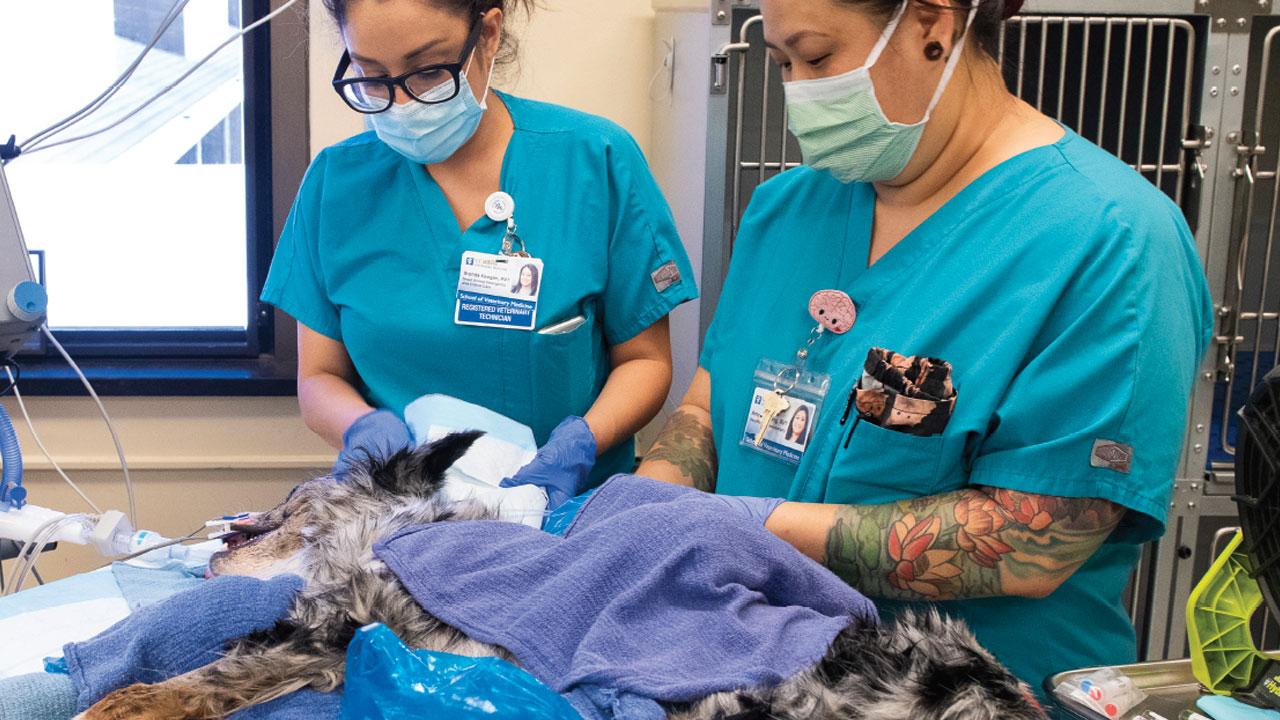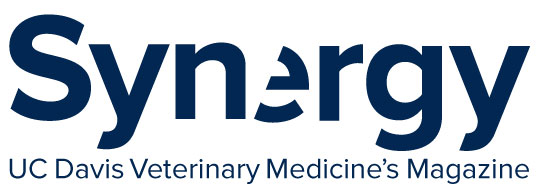
Veterinary Medical Center
“This expansion is absolutely critical for the ER to continue its high standards of compassionate care.”
– Dr. Kate Hopper
Hospital Increases ER/ICU Space
As outdoor cats often do, Tiger went off on an adventure and went missing for a day. When he returned, the 3-year-old Maine Coon was lethargic, in respiratory distress, and appeared to have lost a significant amount of weight. After diagnosing Tiger with a pyothorax (infectious fluid build-up in the chest cavity), his primary veterinarian referred him to the UC Davis veterinary hospital’s Emergency Room (ER).
It was there that critical care specialists worked with the Diagnostic Imaging and the Soft Tissue Surgery Services to identify and remove a foxtail on the left side of his chest.
“A foxtail pyothorax is very unusual in cats,” said Dr. Kate Hopper, a critical care specialist and director of the Small Animal Clinic. “Unfortunately, we see them often in dogs, but it’s a rare occurrence in cats. Tiger’s family did a great job in getting him the critical care he urgently needed.”
With the pandemic forcing many Northern California ERs to initially close, admissions to the UC Davis ER increased 25% since early 2020. Historically, the ER caseload has steadily increased since 2013, to an average of 520 cases per month in 2020 (860 in July 2020 alone), as compared to 200 per month in 2013.

The hospital’s current ER has only two treatment tables. Built in 1970, it was designed to see only a fraction of the current 7,000 patients per year seen by the Emergency and Critical Care Service. While successfully rising to the challenge of continuing to provide high quality care, the ER team is starting to feel the effects of working in such a small space. To operate at maximum efficiency and provide the optimal teaching environment for students and
house officers, an ER of its caseload should have at least four to six tables.
“This caseload increase is stretching our personnel and resources to an extreme extent,” said Dr. Karl Jandrey, associate dean of Admissions and Student Programs, and a long-time member of the ER’s faculty. “Our large and diverse caseload provides a tremendous learning environment for our students and house officers, but we have to ensure those opportunities are not jeopardized by the limited footprint in which we train them.”
To that end, the ER/Intensive Care Unit (ICU) space is being renovated thanks to an anonymous donor, which will nearly double its current treatment space from 861 square feet to 1,611 square feet. The renovation project will be done in conjunction with the construction of the All Species Imaging Center (ASIC), part of Phase I of the future Veterinary Medical Center (VMC). The ASIC will be built against the south side of the veterinary hospital, near the ER/ICU’s location.
A potential feature of the ASIC would be a respite area for hospitalized dogs along with a rooftop personnel break area. Since the entrance to that ASIC rooftop area would be near the second-floor location of the ER/ICU, and construction in that area would be necessary regardless, concurrent timing of the ER/ICU renovation was appropriate.
“This expansion is absolutely critical for the ER to continue its high standards of compassionate care,” said Hopper. “It is exceptional that our team has maintained such a highly-rated and sought-after ER under these circumstances. It says a lot about the fortitude of this team and its commitment to our patients through collaborative care and teamwork.”
Following his immediate surgical recovery in the ICU for one night, Tiger was hospitalized for an additional five nights. He later recovered well at home. His critical care team looks forward to a much-improved environment in which to train students and help more animals like Tiger. The creation of this larger ER/ICU footprint will maintain UC Davis’ high standard of care for years to come.
If you'd like to partner with us on constructing the new Veterinary Medical Center, please contact the Office of Advancement at 530-752-7024 or svmadvancement@ucdavis.edu.
